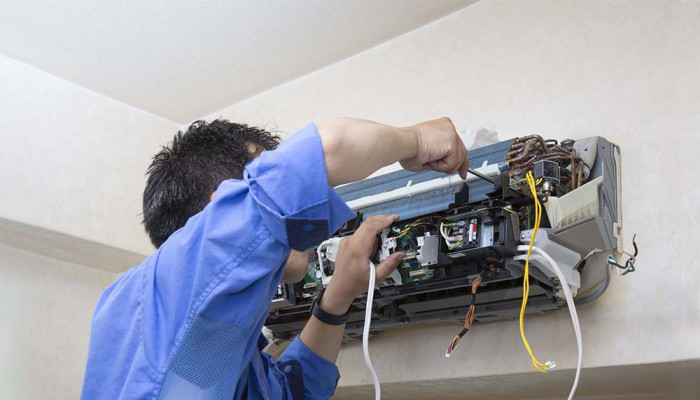 Launch apps instantly. Claim $200 credits on DigitalOcean
Launch apps instantly. Claim $200 credits on DigitalOcean
Beat the Florida heat: Making sure your AC system runs efficiently
Written by Alessandro Raffaele » Updated on: March 20th, 2024

As the scorching Florida sun beats down on your home, there's nothing quite like the sweet relief of stepping into a cool and comfortable oasis. Your Florida air conditioning system is your trusty companion in the battle against the relentless heat, but is it performing at its best? In this blog post, we'll explore how to beat the Florida heat by ensuring your AC system runs efficiently. Stay tuned for valuable tips on keeping cool while saving money!
The Importance of an Efficient AC System
In the blistering Florida heat, an efficient AC system is not just a luxury but a necessity. A well-functioning air conditioner not only keeps your home cool and comfortable but also helps maintain good indoor air quality. It plays a crucial role in reducing humidity levels, which can prevent mold growth and protect your belongings from moisture damage.
Moreover, an efficient AC system can lower energy bills by operating more effectively and consuming less power. By ensuring that your unit is running at its peak performance, you can enjoy enhanced comfort without breaking the bank. Regular maintenance and timely repairs are key to prolonging the lifespan of your AC system and maximizing its efficiency.
Don't underestimate the impact of a properly functioning air conditioner – it's not just about staying cool; it's about creating a healthy environment for you and your family to thrive in.
Signs of an Inefficient AC System
Are you noticing warm air coming from your vents when your AC is on full blast? That could be a sign of an inefficient system struggling to cool the air properly. Another indicator is uneven cooling throughout your home, with some rooms feeling like saunas while others are chilly. Keep an eye out for sudden spikes in your energy bills without a corresponding increase in usage - this could mean your AC is working overtime to maintain a comfortable temperature.
If you hear strange noises like banging or rattling coming from your unit, it might be time for a check-up. Excess humidity in the air despite running the AC constantly can also indicate inefficiency. And if you're frequently calling for repairs or experiencing frequent breakdowns, it's worth investigating whether your system needs an upgrade to keep up with Florida's heat.
Maintenance Tips for Optimal Performance
Regular maintenance is key to ensuring your AC system runs efficiently, especially in the scorching Florida heat. Start by changing or cleaning the air filters every 1-3 months to prevent debris buildup and improve airflow. Check the evaporator and condenser coils for dirt and clean them as needed to enhance cooling efficiency.
Keep an eye on the thermostat settings to avoid unnecessary strain on your unit. Inspect and clear any obstructions around the outdoor unit like plants or debris that could hinder airflow. Schedule annual professional tune-ups to identify potential issues early on and keep your system running smoothly.
Don't forget about the ductwork - ensure it's well-insulated and sealed properly to prevent cool air from escaping. Monitor refrigerant levels regularly and address any leaks promptly for optimal performance all year round.
Upgrading to a More Energy-Efficient Unit
Are you looking to beat the Florida heat while also saving money on your energy bills? Consider upgrading to a more energy-efficient AC unit. Not only will this help reduce your carbon footprint, but it can also lead to significant cost savings in the long run.
Newer models of air conditioning systems are designed to be more energy-efficient, meaning they consume less electricity while still keeping your home cool and comfortable. By investing in a high-efficiency unit, you can enjoy better performance with lower operating costs.
When choosing a new AC system, look for units with a high SEER (Seasonal Energy Efficiency Ratio) rating. The higher the SEER rating, the more efficient the unit is at cooling your home without using excess energy.
Consulting with an HVAC professional can help you determine the right size and type of system for your home's specific needs. Upgrading to a more energy-efficient unit is not only beneficial for your wallet but also for the environment.
Alternative Options for Cooling Your Home
When the Florida heat becomes unbearable, and your AC system needs a break, there are alternative options to keep your home cool. One option is using fans strategically placed throughout your living space. Ceiling fans can help circulate air and create a cooling breeze during hot days.
Another alternative is to invest in portable air conditioning units for specific rooms that need extra cooling. These units are energy-efficient and can provide immediate relief in targeted areas of your home. You can also consider using window coverings like blinds or curtains to block out sunlight and reduce heat gain indoors.
Don't underestimate the power of proper insulation in keeping your home cool. Insulated windows and doors help maintain a consistent temperature inside, reducing the workload on your AC system. You can explore the option of installing a programmable thermostat to regulate temperatures efficiently while maximizing energy savings throughout the day.
Conclusion: Staying Cool and Saving Money in Florida's Heat
When it comes to staying cool and saving money in Florida's heat, having an efficient AC system is key. By recognizing the signs of an inefficient unit, performing regular maintenance, considering upgrades to more energy-efficient models, and exploring alternative cooling options, you can ensure a comfortable home while keeping your energy bills in check. Remember to stay proactive in caring for your AC system so that it can work efficiently throughout the scorching Florida summers. Stay cool and enjoy the comfort of your well-maintained air conditioning system!
Copyright © 2024 IndiBlogHub.com Hosted on Digital Ocean









Post a Comment
To leave a comment, please Login or Register